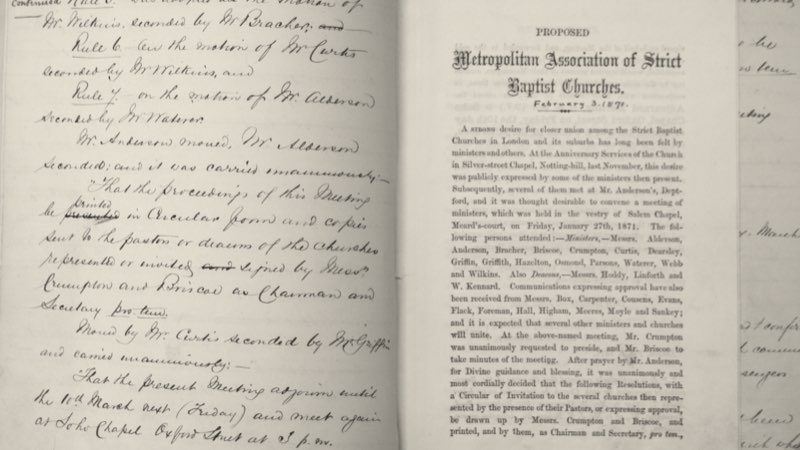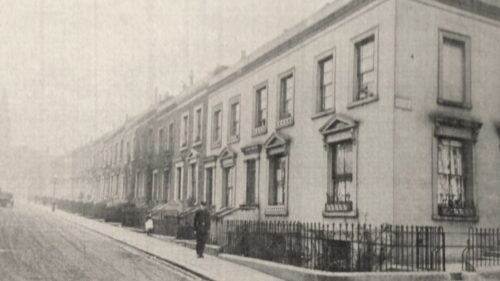-
The Formation Of The Metropolitan Association Of Strict Baptist Churches
The formation of the Metropolitan Association of Strict Baptist Churches is inseparably linked with the church meeting at Silver Street Chapel, Notting Hill Gate, and her pastor, David Crumpton. The Association, church and pastor subscribed to a restricted communion table and the tenets of Hyper-Calvinism. These are the leading features which set apart the Strict Baptist denomination from other churches, unions, societies and associations. On 4 April 1866, a Strict and Particular Baptist Church was organized in Stormont House, Queen’s Road, Bayswater, London. Several of the founding members seceded from the Strict Baptist church, meeting on Johnson Street, Notting Hill Gate. On the day of the new church’s formation, David Crumpton was appointed the pastor. Within two years, the church acquired a building—the Silver Street…
-
38 Bible Doctrine – Confessional Statements And Their Proper Use
I would like to welcome you back to another study in Bible Doctrine. In our previous two studies, I have given a historic and doctrinal overview of John Gill’s Goat Yard Declaration of Faith. And then, towards the end of our last study, I pointed out some of the major differences between the 1689 Confession and the 1729 Declaration. In a nutshell, the 1689 Confession is representative of 17th century Hyper-Calvinism, whereas the 1729 Declaration is representative of 18th century Hyper-Calvinism. More specifically, 17th century Hyper-Calvinism, represented by the 1689 Confession, is based on a threefold covenantal framework, pushing to the forefront a conditional covenant of grace. Forthwith, saving faith is viewed as a legal duty imposed upon unregenerate sinners, resulting in a conditional salvation;…
-
The Origins Of The Particular And The Reformed Baptists
This question was recently put to me by a friend: ”Jared are you on the same side with Sam Renihan and his father on the issue of origins of Particular Baptists and Reformed Baptists?” My answer (with a few additions for the sake of clarity): No, we certainly would not be in agreement with the Reformed Baptists’ view on these matters. The reformed Baptist movement began in England during the 1950’s, taking over historic Particular Baptist churches and ‘unreforming’ them to align with their teachings. The group of Particular Baptist churches they commandeered belonged to the Metropolitan Association of Strict Baptist Churches (London). The church that I pastored for twenty years was
-
37 An Examination Of Gill’s Goat Yard Declaration Of Faith (1729)
I would like to welcome you back to another study in Bible Doctrine. In our previous study, I laid out for you a historic backdrop to Gill’s Goat Yard Declaration. For this study, I would like to look at the document itself. However, it seems appropriate, given the fact that the Declaration was designed for a single congregation, that we first take a look at that congregation, to gain a bird’s eye view of its history and doctrinal positions. The Goat Yard Declaration was named after the church for which it was drawn up. It was known as the church meeting at Goat’s Yard Passage, on Fair Street, in Horsley-Down, Southwark, and they met in the Goat’s Yard Chapel. The origin of the church may…
-
36 A Historical Backdrop To Gill’s Goat Yard Declaration Of Faith (1729)
I would like to welcome you back to another study in Bible Doctrine. In our previous study, I introduced you to the ministry and writings of an 18th century Baptist theologian named John Gill. Aside from his pastoral duties in London, he was a prolific writer, the author of more than twenty-five works, many of which were large and exhaustive volumes. Of these works, there are four which I recommended you should have and of which you should make frequent use: 1. “The Cause of God and Truth” (1735-38) 2. “An Exposition of the Old and New Testaments” (1746-48; 1763-66) 3. “Goat Yard Declaration of Faith” (1729) 4. “A Body of Doctrinal and Practical Divinity” (1769-70) Having already given an overview and samples of the…
-
What Is A Reformed Baptist?
According to the Founders Ministries, Tom Hicks serves as the Senior Pastor of First Baptist Church of Clinton, LA. He also serves on the board of directors for Covenant Baptist Theological Seminary and is an adjunct professor of historical theology for the Institute of Reformed Baptist Studies. I was recently asked to give a response to his article entitled “What is a Reformed Baptist”. I submit the following, believing it may be of help to others who are examining the differences between the Reformed and Particular Baptists. Tom Hicks writes:








